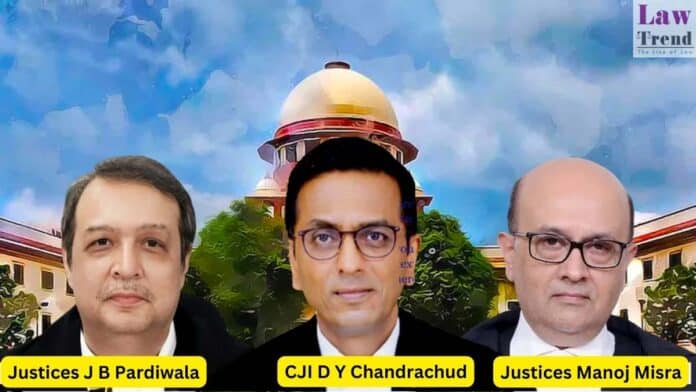The Supreme Court on Thursday upheld certain key provisions of the Insolvency and Bankruptcy Code (IBC) amid the claim of several petitioners that that they are violative of fundamental rights like the right to equality of those against whom insolvency proceedings are initiated.
A bench comprising Chief Justice D Y Chandrachud and justices J B Pardiwala and Manoj Misra decided as many as 391 petitions challenging various provisions of the IBC. Many pleas challenged the constitutional validity of sections 95(1), 96(1), 97(5), 99(1), 99(2), 99(4), 99(5), 99(6) and 100 of the Code.
These provisions deal with the various stages of insolvency proceedings against a defaulting firm or individuals.
Upholding the provisions to be constitutionally valid, the bench held that they did not suffer from arbitrariness as contended.
“The IBC cannot be held to be operating in a retroactive manner in order to hold it violative of the Constitution. Thus, we hold that the statute does not suffer from the vices of manifest arbitrariness,” the CJI said while pronouncing the verdict.
Earlier, the top court had, on different dates, issued notices on petitions challenging IBC provisions on various grounds.
All 391 petitions, including the lead one filed by Surendra B Jiwrajka, were later clubbed together for an authoritative pronouncement on legal issues.
One of the petitions filed by R Shah through advocate Anne Mathew challenged several provisions of the IBC and said,”The impugned provisions are inherently violative of the principle of natural justice and strike at the root of the right of livelihood, right to trade and profession, and also the right to equality of the petitioner under Article 21 (right to life), 19(1)(g) (Right to practice any profession), and 14 (right to equality, respectively, of the Constitution”.
It said none of the impugned provisions contemplated any opportunity of granting hearing to an alleged personal guarantor before appointment of the resolution professional and imposition of moratorium on the assets of the personal guarantor.
Also Read
“Interestingly, Section 96(1) of the IBC imposes the rigour of moratorium upon the alleged guarantor, automatically, upon mere filing of the application under Section 95 of the Code, without any requirement of prior notice which itself is violative of the basic canons of the principles of natural justice.
“Such restrictions on the liberties of a person, including restrictions to discharge any debt, without affording any opportunity of hearing are not only ultra vires of the Constitution but also unknown in law,” it said.
The scheme of the Section 97(5) of the Code does not contemplate any alternative to appointment of a Resolution Professional, it said.




